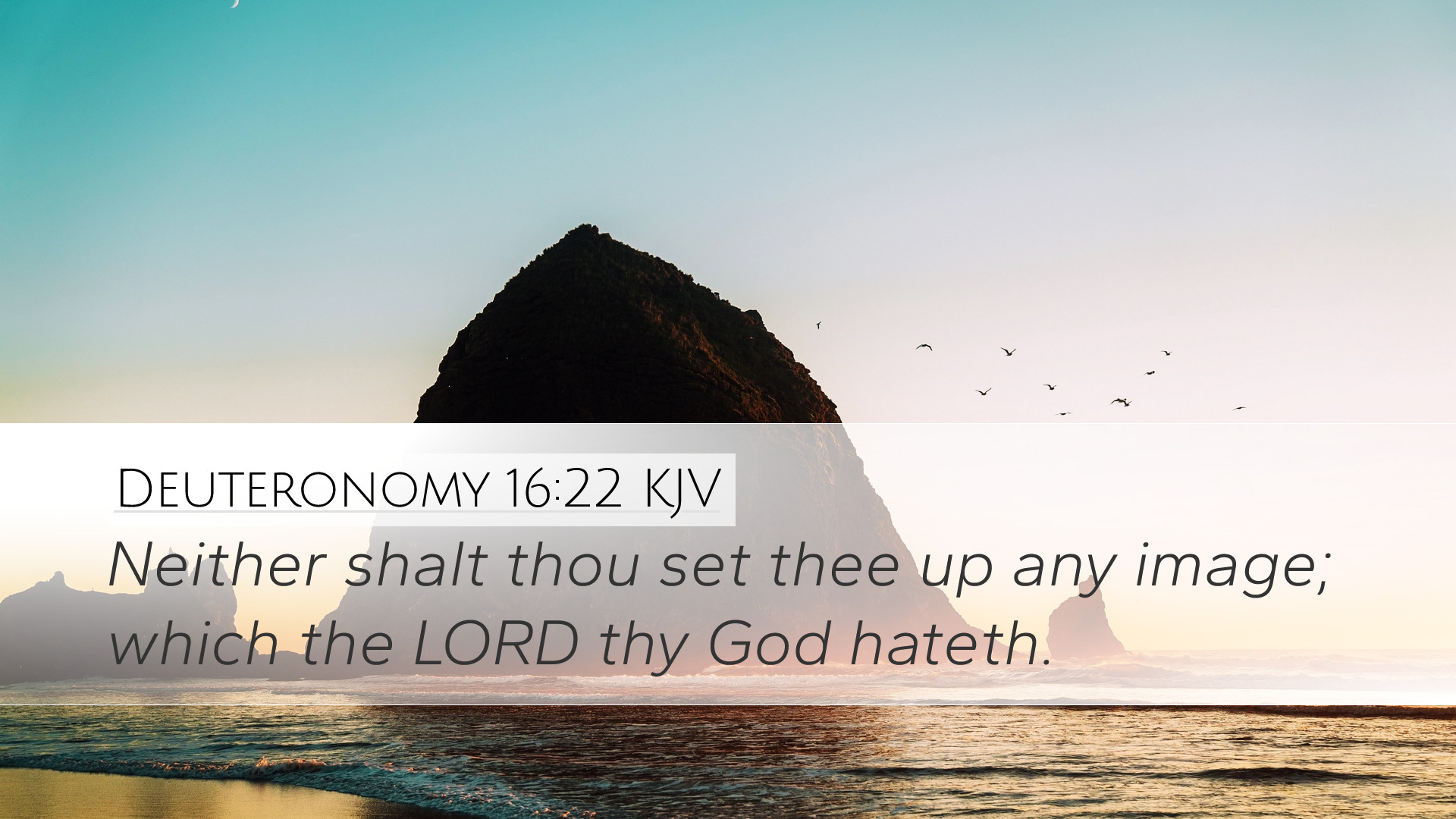Commentary on Deuteronomy 16:22
Verse: "Neither shalt thou set thee up any image; which the LORD thy God hateth."
Introduction
Deuteronomy 16:22 stands as an admonition against idolatry, emphasizing the importance of exclusive worship of the one true God. This verse is part of Moses’ farewell address, where he reiterates the covenant relationship between God and Israel. The significance of this command is layered through its historical, theological, and practical implications.
Theological Significance
The commandment prohibits the setting up of images as objects of worship, highlighting God's fierce opposition to idolatry. Theological perspectives from public domain commentaries elucidate the character of God as one desiring a pure, undefiled relationship with His people.
-
Matthew Henry:
Henry explains that the prohibition is rooted in God's nature, as He is a spiritual being who cannot be accurately depicted or contained in physical form. As such, the creation of images distracts from true faith and devotion.
-
Albert Barnes:
Barnes notes that the inclusion of this command within the broader framework of laws intended for worship underscores its importance. It serves as a reminder that true worship must stem from a heart directed toward the invisible God, rather than material representations.
-
Adam Clarke:
Clarke suggests that the penalty of establishing such images was severe because it could lead the nation astray, away from fidelity to God. Idolatry, as depicted throughout Israel's history, was not merely a breach of ritual, but a fundamental departure from covenant loyalty.
Historical Context
Understanding the historical backdrop of Israel’s journey is crucial in interpreting this commandment. The people of Israel had just come from Egypt, a land rife with idols. As they prepared to enter Canaan, they faced the lure of local Canaanite religious practices that involved idol worship.
-
Matthew Henry:
He emphasizes that the Israelites were repeatedly warned about the temptations they would face in Canaan, urging them to remember their deliverance from Egyptian idolatry and to remain firmly rooted in monotheism.
-
Albert Barnes:
Barnes remarks on the persistence of idol worship throughout Israel’s history, cautioning that the danger of succumbing to cultural influences remained a recurring theme.
-
Adam Clarke:
Clarke provides a historical overview, discussing how the neighboring nations’ practices could infiltrate Israelite worship, leading them away from the purity of their covenant relationship with the Lord.
Practical Application
The implications of this verse extend beyond ancient Israel to contemporary readers. The call to avoid idolatry challenges modern believers to examine what they hold dear and the potential distractions from a devoted life to God.
-
Matthew Henry:
Henry calls believers to introspection, encouraging them to identify any 'images' in their lives that might interfere with their relationship with God—be it material possessions, status, or even certain relationships.
-
Albert Barnes:
Barnes points to the importance of maintaining integrity in worship and warns against any practices that might equate God with the created order. He urges believers to cultivate a spirit of true worship in spirit and truth.
-
Adam Clarke:
Clarke emphasizes the need for vigilance against the cultural idols of the contemporary world, which can be as invasive as those faced by the Israelites. He stresses the importance of maintaining a clear focus on God’s word and standards.
Conclusion
Deuteronomy 16:22 serves as a potent reminder of God’s call for exclusive allegiance and the dangers posed by idolatry. Through the insights of Matthew Henry, Albert Barnes, and Adam Clarke, we see the deep theological, historical, and practical layers of meaning within this prohibition. As pastors, students, theologians, and scholars, the challenge remains to ensure that our worship of God is pure and free from the distractions of our age, acknowledging that the struggle against idolatry is both timeless and urgent.


